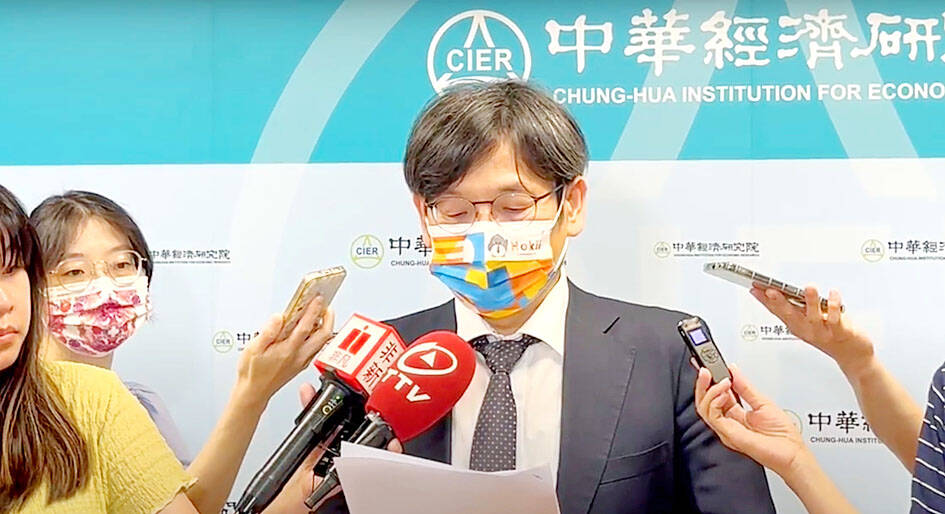The official manufacturing purchasing managers’ index (PMI) last month fell deeper into contraction territory, as declines in new orders and production sharpened, the Chung-Hua Institution for Economic Research (CIER, 中華經濟研究院) said yesterday.
The index slid 1.5 points to 41.3 last month.
PMI data aim to gauge the health of the manufacturing industry, with values over 50 indicating expansion and scores below the threshold suggesting contraction.

Photo courtesy of the Chung-Hua Institution for Economic Research
Inventory has returned to normal levels, but companies by and large remain conservative about purchasing activity due to poor order visibility, CIER president Yeh Chun-hsien (葉俊顯) told a news conference in Taipei.
The cautious sentiment has a lot to do with gloomy economic prospects in the US and unease over falling raw material prices, Yeh said.
Against this backdrop, companies are sticking to conservative business management practices, he said.
The critical subindex on new business orders shed 6.3 points to 34.3, the worst since the launch of the PMI survey in July 2012, the Taipei-based institute said.
The gauge on inventory dropped another 0.6 points to 45.3, while the measure on customers’ inventory weakened 0.2 points to 44.7 and factory production shed 1.6 points to 36.9, the monthly survey showed.
Academia Sinica economics researcher Kamhon Kan (簡錦漢) said that operating conditions would continue to flounder, as the market needs more time to assimilate the impact of the US Federal Reserve’s drastic interest rate hikes.
Furthermore, China has yet to post a healthy recovery from the COVID-19 pandemic, and the shock of bank failures in the US and Europe lingers, Kan said.
That explains why the reading on the six-month business outlook lost 6.7 points to 38.2, with all sectors voicing bleak views, the survey showed.
However, Taiwanese electronics suppliers might benefit from the burgeoning generative artificial intelligence applications and the upcoming release of new iPhone models, Kan said.
Taiwan is a major supplier of electronics used in smartphones, servers and artificial intelligence applications.
Purchasing activity was stable at 52 for non-manufacturing sectors, although it slowed slightly from 55.8 one month earlier, a separate survey showed.
Service providers continued to see a pickup in business after the government removed COVID-19 restrictions, even though shipping, warehousing and logistics facilities proved the exception due to their reliance on exporters, it showed.
Non-manufacturing sectors have mixed views about business prospects, with restaurants, hotels and retailers remaining upbeat, but all other sectors expecting a downturn, it said.

Semiconductor business between Taiwan and the US is a “win-win” model for both sides given the high level of complementarity, the government said yesterday responding to tariff threats from US President Donald Trump. Home to the world’s largest contract chipmaker, Taiwan Semiconductor Manufacturing Co (TSMC, 台積電), Taiwan is a key link in the global technology supply chain for companies such as Apple Inc and Nvidia Corp. Trump said on Monday he plans to impose tariffs on imported chips, pharmaceuticals and steel in an effort to get the producers to make them in the US. “Taiwan and the US semiconductor and other technology industries

CHIP WAR: Tariffs on Taiwanese chips would prompt companies to move their factories, but not necessarily to the US, unleashing a ‘global cross-sector tariff war’ US President Donald Trump would “shoot himself in the foot” if he follows through on his recent pledge to impose higher tariffs on Taiwanese and other foreign semiconductors entering the US, analysts said. Trump’s plans to raise tariffs on chips manufactured in Taiwan to as high as 100 percent would backfire, macroeconomist Henry Wu (吳嘉隆) said. He would “shoot himself in the foot,” Wu said on Saturday, as such economic measures would lead Taiwanese chip suppliers to pass on additional costs to their US clients and consumers, and ultimately cause another wave of inflation. Trump has claimed that Taiwan took up to

A start-up in Mexico is trying to help get a handle on one coastal city’s plastic waste problem by converting it into gasoline, diesel and other fuels. With less than 10 percent of the world’s plastics being recycled, Petgas’ idea is that rather than letting discarded plastic become waste, it can become productive again as fuel. Petgas developed a machine in the port city of Boca del Rio that uses pyrolysis, a thermodynamic process that heats plastics in the absence of oxygen, breaking it down to produce gasoline, diesel, kerosene, paraffin and coke. Petgas chief technology officer Carlos Parraguirre Diaz said that in

Japan intends to closely monitor the impact on its currency of US President Donald Trump’s new tariffs and is worried about the international fallout from the trade imposts, Japanese Minister of Finance Katsunobu Kato said. “We need to carefully see how the exchange rate and other factors will be affected and what form US monetary policy will take in the future,” Kato said yesterday in an interview with Fuji Television. Japan is very concerned about how the tariffs might impact the global economy, he added. Kato spoke as nations and firms brace for potential repercussions after Trump unleashed the first salvo of